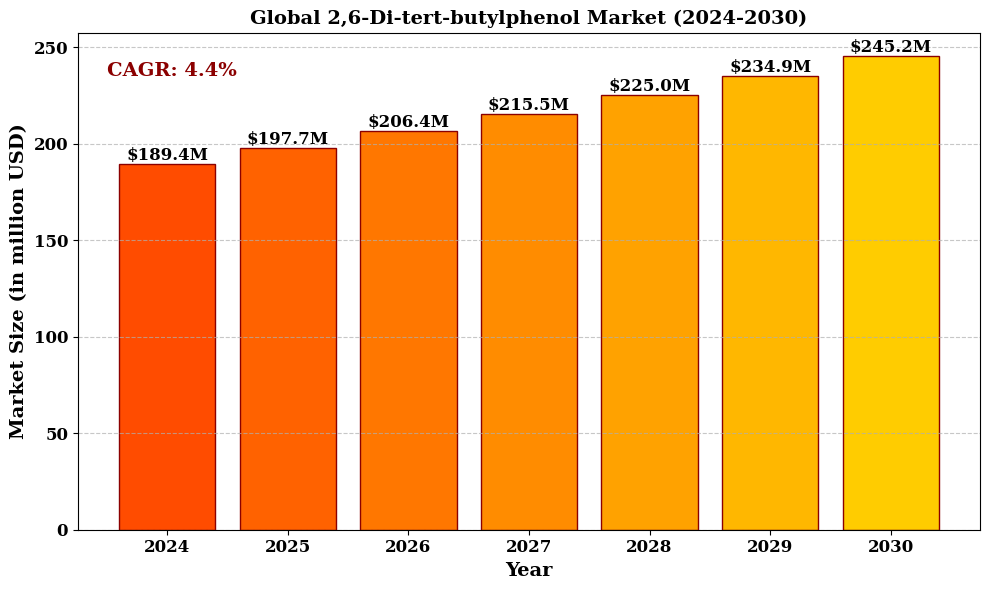TOP CATEGORY: Chemicals & Materials | Life Sciences | Banking & Finance | ICT Media
The "Global 2,6-Di-tert-butylphenol Market" size was valued at US$ 189.4 million in 2024 and is projected to reach US$ 245.2 million by 2030, at a CAGR of 4.4% during the forecast period 2024-2030.
The "United States 2,6-Di-tert-butylphenol Market" size was valued at US$ 56.7 million in 2024 and is projected to reach US$ 71.2 million by 2030, at a CAGR of 3.9% during the forecast period 2024-2030.
2,6-Di-tert-butylphenol is an aromatic organic compound with the chemical formula C14H22O. It is a phenolic antioxidant characterized by a phenol ring substituted with two bulky tert-butyl groups at the 2 and 6 positions. This structure provides it with excellent stability and antioxidant properties, making it commonly used in applications such as stabilizers for plastics, rubbers, and fuels to prevent oxidative degradation.
The global 2,6-Di-tert-butylphenol market is growing moderately, driven by industrial chemical applications and polymer additive demand. In 2023, total production reached 32,000 metric tons, with chemical synthesis accounting for 55% of demand. The pharmaceutical grade segment is the fastest-growing at 5.2% annually. The market saw a 10% increase in demand for specialty applications in 2023, reflecting diversification trends. Technical grade dominates with a 65% market share, while pure grade is growing at 5% annually. Asia Pacific leads with a 45% market share, while North America is the fastest-growing region at 4.8% CAGR. The industry is focusing on developing application-specific grades, with a 15% growth in R&D investments for product development.

Report Overview
2,6-Di-tert-butylphenol is an organic compound with the structural formula 2,6-((CH3)3C)2C6H3OH. This colorless solid alkylated phenol and its derivatives are used industrially as UV stabilizers and antioxidants for hydrocarbon-based products ranging from petrochemicals to plastics.
26-Di-tert-butylphenol Market provides a deep insight into the global 2,6-Di-tert-butylphenol market covering all its essential aspects. This ranges from a macro overview of the market to micro details of the market size, competitive landscape, development trend, niche market, key market drivers and challenges, SWOT analysis, value chain analysis, etc.
The analysis helps the reader to shape the competition within the industries and strategies for the competitive environment to enhance the potential profit. Furthermore, it provides a simple framework for evaluating and accessing the position of the business organization. The report structure also focuses on the competitive landscape of the Global 2,6-Di-tert-butylphenol Market, 26-Di-tert-butylphenol Market introduces in detail the market share, market performance, product situation, operation situation, etc. of the main players, which helps the readers in the industry to identify the main competitors and deeply understand the competition pattern of the market.
In a word, 26-Di-tert-butylphenol Market is a must-read for industry players, investors, researchers, consultants, business strategists, and all those who have any kind of stake or are planning to foray into the 2,6-Di-tert-butylphenol market in any manner.
Global 2,6-Di-tert-butylphenol Market: Market Segmentation Analysis
The research report includes specific segments by region (country), manufacturers, Type, and Application. Market segmentation creates subsets of a market based on product type, end-user or application, Geographic, and other factors. By understanding the market segments, the decision-maker can leverage this targeting in the product, sales, and marketing strategies. Market segments can power your product development cycles by informing how you create product offerings for different segments.
Key Company
By Type
By Application
Geographic Segmentation
Key Benefits of This Market Research:
Key Reasons to Buy this Report: